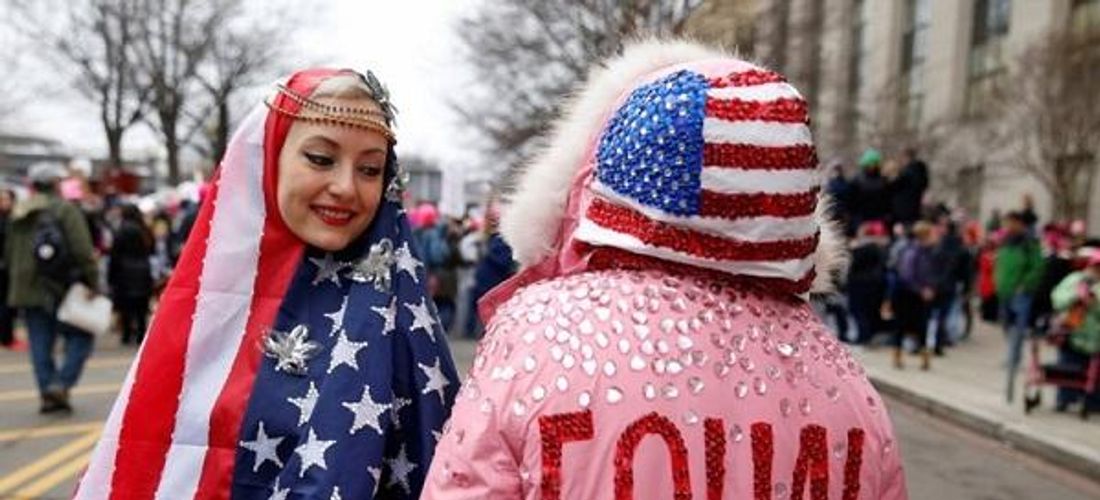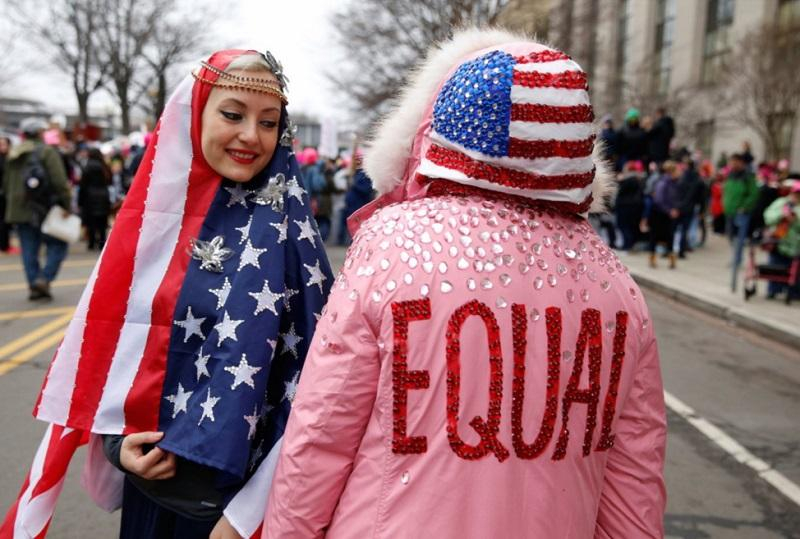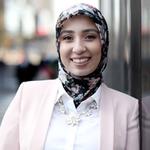Being Unapologetically Muslim in America - Taking Ownership and Remembering our History
Current Events
|
Jul 3, 2019
|
7 MIN READ

Islam is certainly not new to America. Many of the first Muslims in this country were Africans who were forcibly brought here as slaves. What we’re not taught, however, is that even earlier than that, Christopher Columbus was actually guided by Moors (African Muslims from Spain) to show him around “The New World” – because they came to the Americas well before he did.
In fact, Abubakari, the founding emperor of the Mali Empire believed there was another bank to the Atlantic Ocean, and sent a 200 ship expedition to find it back in 1311!

Muslims praying in front of Capitol Hill. Image source: Islamicity.com
Fast forward to today, where Muslims in America are increasing in number – upwards of 3.45 million of us according to the most recent Pew Study – and are far more visible than we’ve ever been. While a large part of that is due to an influx of immigration in the last few decades, we’re at a point where Muslims are comprised of second, third and fourth (and so on) generation Americans.
For Muslims who are immigrants to this country or are children of immigrants, it can be hard to meld Muslim and Western identities. I think it’s because of, in large part, how ingrained our parent’s own culture is within. It often becomes a dichotomy between East and West, Muslim and non-Muslim, that has been the subject of numerous articles, books, essays and podcasts. How can I wear hijab, but still be or look American? How can I fast but attend work functions where food or alcohol is being served? How can I get married and preserve myself when everyone around me is casually dating … where do I even meet my future spouse?
Throw into the mix Islamophobia, seemingly at an all-time high now, so much so that Huffington Post reporter Rowaida Abdelaziz and her coworker developed an Islamophobia tracker that lists all Islamophobic acts and hate crimes that are reported. And now, with the dangerous rhetoric of our Trump-era government against “foreigners” (aka anyone not white, male, or Christian), and the Muslim Ban, young Muslims can be left wrestling with a number of identities and perhaps feeling that they have to choose between them.
Most recently, Arab-Muslim comedian and actor, Ramy Youssef developed a new show for Hulu, titled “Ramy,” that explores how tough it can be to live as a Muslim in America when you’re grappling with your identity and feel like you have to choose between following some of the rules of Islam (no dating, drinking, drugs, premarital sex, etc) and living an American life. It offers an uncomfortable, funny and intimate look at struggles many of us may be having or may have had at some time in our lives.

Ramy Youssef in a scene from his Hulu comedy, "Ramy."
But – many Muslims in the U.S are reclaiming their narratives, breaking free of the stereotypes and living their best lives. NPR ran a piece on Muslim Americans telling their own stories and defining their identities as more than just Muslim or just American. The piece features a beautiful quote by Sheikh Usama Cannon, who described Islam as:
A pure, clear water that takes the color of whatever riverbed it flows over." He said he hopes Muslims in America "can kind of color that bedrock in a beautiful way and can contribute to what is the American project in a way that when that water flows over it, it has a uniquely American and a distinctly American color and flavor but is authentic to itself as a faith tradition.
So, can you bring together the Muslim and American identities? If you ask me, it’s time to move past this conversation. We need to stop treating our multifaceted identities like they’re inherently separate or at battle with one another. They’re not! Yes, there are parts of a generally Western culture that don’t work with the teachings of our faith, namely things like drinking alcohol, premarital sex, hard-partying/doing drugs and so on, but these are all lifestyle choices! When it comes down to it, Islam is all about community, spirituality, and justice, from the way we are taught to interact with each other (and our own selves) with the best of manners down to ensuring no one is deemed guilty without actual witnesses to testify against them.
We’re taught forgiveness, human rights, helping the needy and standing up for what we believe in. We’re taught to have strong faith in God, to fast and pray, to respect and help the elderly and be kind to children. We’re taught to be inclusive, to be generous and to be there for one another. We’re taught to constantly learn, to constantly grow. This is all inherently Muslim, and much about this is inherently American as well.
There is a difference between culture and religion, and much of American Muslims’ disgruntlement with their identities have to do with the negative things some cultures brought to Islam like racism, a seemingly inherent inability to be organized in public (seriously have you seen the lines we attempt to form? It’s chaos!) or be on time to functions. This topic is rather important and needs a whole other post on its own, but is still an important point to note here. But again, choices. These are all choices, none of which have to do with our actual faith. As Usama Cannon said, Islam is a way of life that can work wherever it’s flowing.
It’s time we shed the insecurity and doubt and take pride in our faith.
Step one? If you have doubts, read and learn more. Ask questions – but ask them to the right people who are equipped and knowledgeable enough to answer them. The first verse of the Quran, the first word, actually, that was sent down to Prophet Muhammad (saw) was Iqra (read). Read, learn and grow in your faith. Suhaib Webb actually runs a cool instastories series where he answers Islamic and fiqh questions that are submitted through Instagram’s “ask me anything” feature in an effort to make Islamic jurisprudence more accessible.
But also, learn and study the Quran, and strengthen your own conviction in your faith. If you wear hijab, wear it proudly – don’t try to hide it or conceal it. It’s beautiful. Take pride in your faith, in your identity, in your culture and in your principles! Stop apologizing or hiding it.

Our own Creative Director Gizelle Begler in a bedazzled flag hijab of her own design at the 2017 Women's March. Image source: Reuters and Twitter.
I actually feel like Muslims in the West tend to have a stronger grip on faith, because it’s not the common faith of our land like it is in Muslim countries across the world. We’re forced to learn it ourselves and thus arguably may have more ownership over our faith. We attend masjids for more than just prayer – to give us a sense of community that others overseas don’t feel like they’re missing. While still a struggle, many of us don’t take faith for granted and don’t have it muddied or confused with culture as much. We’ve built some of the most beautiful communities across the country, and it’s something to be proud of.
That’s not to say that Muslims in the West are better than Muslims in Muslim-majority countries - not at all - but we have a unique opportunity to create a Muslim identity that is made up of a beautiful and diverse group of people that you won’t see anywhere else. Our sense of belonging is built on our shared faith.
I’d like to end with this:
Our forefathers (or for first- and second-generation American Muslims, our own fathers) came here and were tasked with survival. They had to support their families, start from scratch, build Muslim communities, schools and masajid from nothing. This is not something to be dismissed or taken lightly. If I try to wrap my head around what our parents or grandparents did for us, it blows my mind, and I’m left in awe and appreciation.
As Melanie has said in her talks before, they had to suppress their dreams and work to survive. And so, it comes as no surprise that we are encouraged by them to strive for high paying careers like medicine, because they don’t want us to struggle as they did. They had little time for anything else.
Now, we’re tasked with something different. Some of us – and I say some because I recognize that there are still many Muslims or Muslim minority communities who are still struggling due to systemic racism, poverty, discrimination, etc – but some of us have the luxury to follow our dreams and passions and use our God-given talents to be a force for good in this world. It’s a rare opportunity that not many people have, and thus not one we should take for granted. If Allah (S) gives you blessings, it’s for a reason. In fact, according to a Pew Research Study, Muslims have the highest level of schooling among religious groups in America! Talk about an American Muslim identity! Think, reflect, and be a force for change!
As Muslims living in Trump-era America, we must rise to the occasion and be known for justice – we must be at the forefront of movements that demand equality, humane treatment for immigrants (have you seen the concentration camps our government is running at the Mexican-American border?!!), and champion just policy. We must demand more of our government - as the hadith goes, condemn with our hearts, our tongues, and our actions. (See Ilhan Omar, Rashida Tlaib, Linda Sarsour, Sheikh Omar Suleiman, among others.).
Take unapologetic ownership of your identity as a Muslim American, and take ownership of the state of your country! It’s your American duty after all!
Subscribe to be the first to know about new product releases, styling ideas and more.
What products are you interested in?

